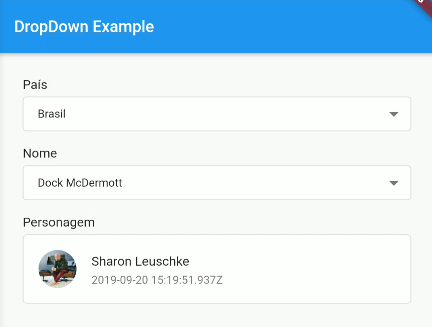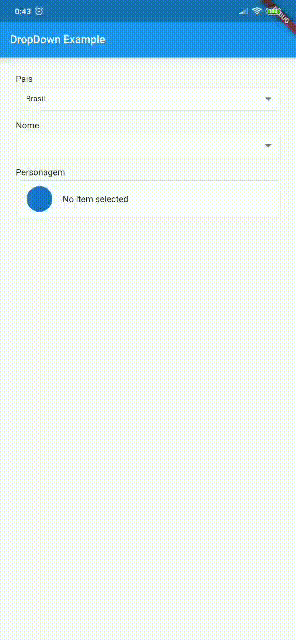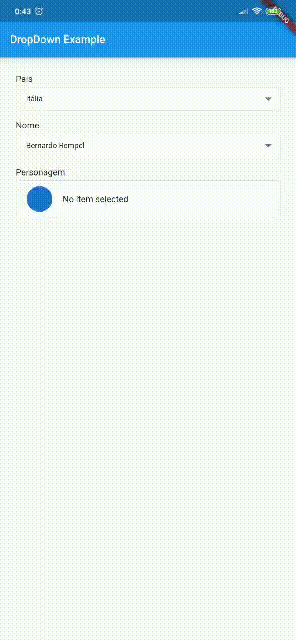find_dropdown 1.0.0  find_dropdown: ^1.0.0 copied to clipboard
find_dropdown: ^1.0.0 copied to clipboard
Simple and robust FindDropdown with item search feature, making it possible to use an offline item list or filtering URL for easy customization.
FindDropdown package - [ver em português] #
Simple and robust FindDropdown with item search feature, making it possible to use an offline item list or filtering URL for easy customization.




ATTENTION #
If you use rxdart in your project in a version lower than 0.23.x, use version 0.1.7+1 of this package. Otherwise, you can use the most current version!
Versions #
RxDart 0.23.x or less: 0.1.7+1 Non Null Safety Version: 0.2.3 or less Null Safety Version: 1.0.0 or more
packages.yaml #
find_dropdown: <lastest version>
Import #
import 'package:find_dropdown/find_dropdown.dart';
Simple implementation #
FindDropdown(
items: ["Brasil", "Itália", "Estados Unidos", "Canadá"],
label: "País",
onChanged: (String item) => print(item),
selectedItem: "Brasil",
);
Multiple selectable items #
FindDropdown<String>.multiSelect(
items: ["Brasil", "Itália", "Estados Unidos", "Canadá"],
label: "País",
onChanged: (List<String> items) => print(items),
selectedItems: ["Brasil"],
);
Validation #
FindDropdown(
items: ["Brasil", "Itália", "Estados Unidos", "Canadá"],
label: "País",
onChanged: (String item) => print(item),
selectedItem: "Brasil",
validate: (String item) {
if (item == null)
return "Required field";
else if (item == "Brasil")
return "Invalid item";
else
return null; //return null to "no error"
},
);
Endpoint implementation (using Dio package) #
FindDropdown<UserModel>(
label: "Nome",
onFind: (String filter) async {
var response = await Dio().get(
"http://5d85ccfb1e61af001471bf60.mockapi.io/user",
queryParameters: {"filter": filter},
);
var models = UserModel.fromJsonList(response.data);
return models;
},
onChanged: (UserModel data) {
print(data);
},
);
Change or Clear selected items #
var countriesKey = GlobalKey<FindDropdownState>();
Column(
children: [
FindDropdown<UserModel>(
label: "Nome",
onFind: (String filter) => getData(filter),
searchBoxDecoration: InputDecoration(
hintText: "Search",
border: OutlineInputBorder(),
),
onChanged: (UserModel data) {
print(data);
countriesKey.currentState.setSelectedItem(null);
},
),
FindDropdown<String>(
key: countriesKey,
items: ["Brasil", "Itália", "Estados Unidos", "Canadá"],
label: "País",
selectedItem: "Brasil",
showSearchBox: false,
onChanged: (selectedItem) => print("country: $selectedItem"),
),
],
)
MORE EXAMPLES #
Layout customization #
You can customize the layout of the FindDropdown and its items. EXAMPLE
To customize the FindDropdown, we have the dropdownBuilder property, which takes a function with the parameters:
BuildContext context: current context;T item: Current item, where T is the type passed in the FindDropdown constructor.
To customize the items, we have the dropdownItemBuilder property, which takes a function with the parameters:
BuildContext context: current context;T item: Current item, where T is the type passed in the FindDropdown constructor.bool isSelected: Boolean that tells you if the current item is selected.
Attention #
To use a template as an item type, you need to implement toString, equals and hashcode, as shown below:
class UserModel {
final String id;
final DateTime createdAt;
final String name;
final String avatar;
UserModel({this.id, this.createdAt, this.name, this.avatar});
@override
String toString() => name;
@override
operator ==(o) => o is UserModel && o.id == id;
@override
int get hashCode => id.hashCode^name.hashCode^createdAt.hashCode;
}
